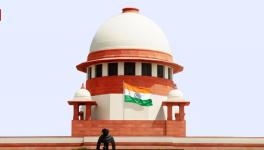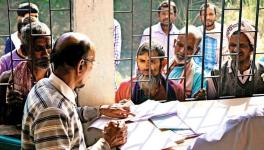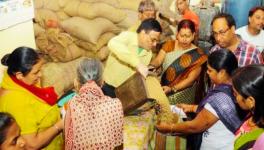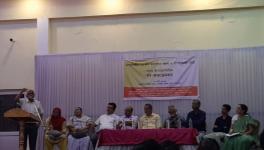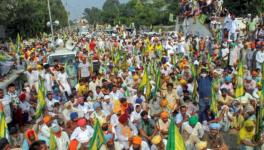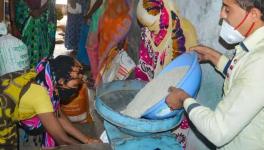No Ration for the poor as Biometric Authentication for Aadhaar Fails

Newsclick Graphic by Shoili
A group of civil society activists have demanded that the CEO of the Unique Identification Authority of India (UIDAI), Ajay Bhushan Pandey, hold a public discussion where evidence can be presented of the impact of the mandatory Aadhaar-based biometric authentication on the delivery of public services.
The activists — Anjali Bhardwaj, Nikhil Dey, Dipa Sinha and Amrita Johri — wrote to Pandey on August 17, after he attributed “malafide intent” to a press conference organised by them exposing exclusions in the Public Distribution System (PDS) in Rajasthan, Jharkhand and Delhi after biometric authentication was made mandatory each time the beneficiaries queued up to get ration.
They had also presented the result of two Right to Information (RTI) applications, revealing that there was no official data to back the claim, that nearly 4 crore bogus ration cards had been eliminated through use of technology and Aadhaar. This was a statement made by the Prime Minister in the Lok Sabha on February 7.
Pandey told the media, that saying Aadhaar was responsible for the denial of public benefits, was a “misconstrued fact presented with malafide intent.”
The UIDAI chief also claimed that “if a person is denied [public benefits] because he does not have Aadhaar or he is unable to biometrically authenticate, it is undisputedly a violation of instructions issued by the government and such violators have to be punished”.
Responding to this, the activists wrote that they had “little knowledge of any such punishment that might have been ordered and carried out”. They demanded that the UIDAI make public “a copy of all such instructions issued by the government, especially in the context of Delhi, Jharkhand and Rajasthan. The copy should also include the punishment that violators are liable to face.”
“Also, kindly put the list of violators who have been punished in the last 3 years in the public domain,” they added, while inviting Pandey for a “public dialogue”.
“If you agree, we will fix a mutually convenient time and place,” the letter said.
On August 8, activists from the Right to Food Campaign (which was instrumental in the passage of the National Food Security Act 2013), Satark Nagrik Sangathan, Mazdoor Kisan Shakti Sangathan and Delhi Rozi Roti Adhikar Abhiyan, came together in Delhi to present their on-ground findings, about the impact of Aadhaar on welfare schemes — especially the PDS.
As of July 2017, in Rajasthan, 33% of the holders of the NFSA ration cards, which have been seeded with Aadhaar, were unable to procure their rations from the PDS outlets — because of repeated problems in biometric authentication of fingerprints, and internet connectivity issues in the Point of Sale machines.
The activists also presented interim findings from an IIT Delhi field study along with Ranchi University that showed flagrant exclusions as well as continuing quantity fraud, higher transaction costs and hardships for the most vulnerable sections of the population in Jharkhand, since Aadhaar linking was made mandatory for the PDS in the state.
The press conference also saw testimonies of beneficiaries from Delhi, including homeless people, some of whom have also filed affidavits in the Delhi High Court. They talked about the different ways in which they had been unable to access their ration entitlements since Aadhaar was made mandatory for ration.
Get the latest reports & analysis with people's perspective on Protests, movements & deep analytical videos, discussions of the current affairs in your Telegram app. Subscribe to NewsClick's Telegram channel & get Real-Time updates on stories, as they get published on our website.










